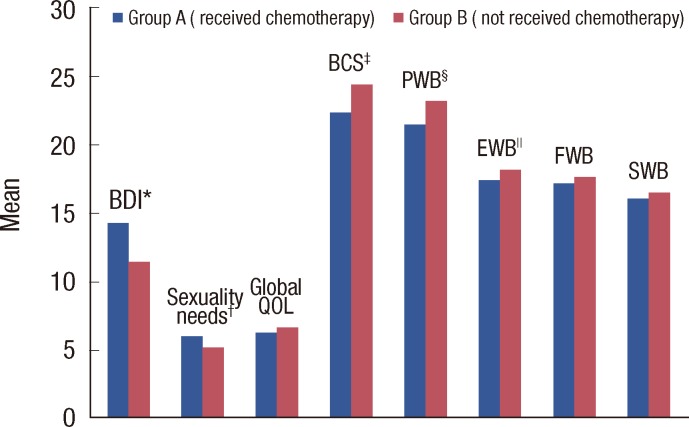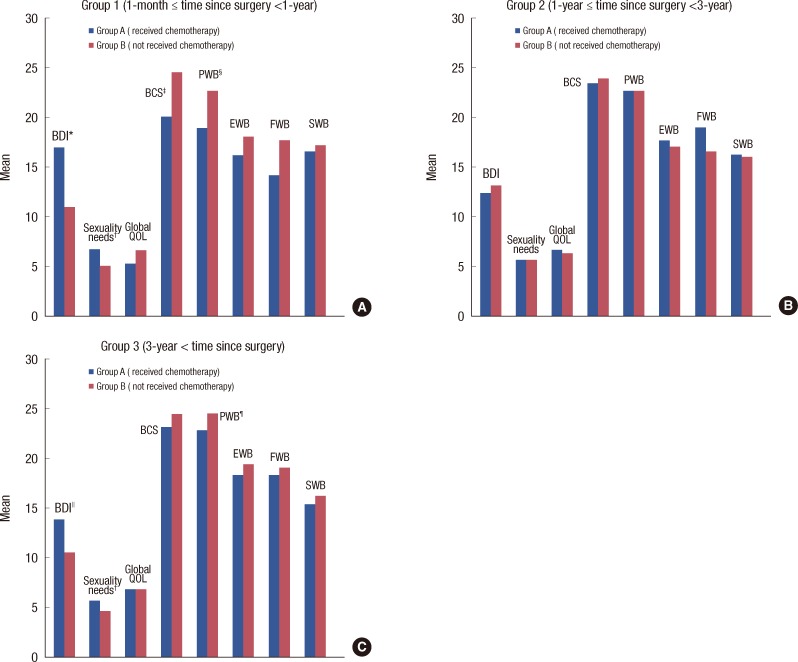J Breast Cancer.
2013 Jun;16(2):229-235. 10.4048/jbc.2013.16.2.229.
Does Chemotherapy Really Affect the Quality of Life of Women with Breast Cancer?
- Affiliations
-
- 1Department of Social Welfare, Duksung Women's University College of Social Sciences, Seoul, Korea.
- 2Gachon University College of Nursing, Incheon, Korea.
- 3Department of Surgery, Yonsei University Health System, Yonsei University College of Medicine, Seoul, Korea. bwpark@yuhs.ac
- KMID: 2286406
- DOI: http://doi.org/10.4048/jbc.2013.16.2.229
Abstract
- PURPOSE
The aims of this cross-sectional study were to explore and evaluate the impact of adjuvant chemotherapy on quality of life in breast cancer patients according to the survival time from surgery.
METHODS
Completed questionnaires were collected from 534 women with breast cancer. Clinical and sociodemographic characteristics were reviewed and Functional Assessment of Cancer Therapy-Breast cancer instrument, global quality of life, Beck Depression Inventory, and unmet sexuality needs were administered. Descriptive statistics, t-tests, chi-square tests and multiple analysis of covariance were performed while controlling for confounding variables.
RESULTS
Statistically significant differences were found between chemotherapy and no chemotherapy group on depression (p=0.026), unmet sexuality needs (p=0.010), breast cancer specific concerns (p=0.010), physical well-being (p=0.001), and emotional well-being (p=0.028). Chemotherapy effects also varied according to survival time since surgery such as for group 1 (<1 year since surgery), significant differences were found on Beck Depression Inventory (p=0.042), unmet sexuality needs (p=0.016), breast cancer subscale (p=0.004), and physical well-being (p=0.016) and for group 3 (>3 years since surgery) on depression (p=0.019) and physical well-being (p=0.028) respectively; however, there were no significant differences between chemotherapy and no chemotherapy group for group 2 (1-3 years since surgery).
CONCLUSION
As expected, breast cancer patients who underwent adjuvant chemotherapy experienced significantly worse quality of life than those who did not receive chemotherapy. Furthermore, the adverse chemotherapy effects on the quality of life appear to vary according to the time since surgery. These results suggest that health care professionals may need to address long-term as well as short-term chemotherapy side-effects and intervene accordingly to enhance quality of life of breast cancer patients.
MeSH Terms
Figure
Reference
-
1. Azim HA Jr, de Azambuja E, Colozza M, Bines J, Piccart MJ. Long-term toxic effects of adjuvant chemotherapy in breast cancer. Ann Oncol. 2011; 22:1939–1947. PMID: 21289366.
Article2. Ganz PA, Desmond KA, Leedham B, Rowland JH, Meyerowitz BE, Belin TR. Quality of life in long-term, disease-free survivors of breast cancer: a follow-up study. J Natl Cancer Inst. 2002; 94:39–49. PMID: 11773281.
Article3. Engel J, Kerr J, Schlesinger-Raab A, Sauer H, Hölzel D. Quality of life following breast-conserving therapy or mastectomy: results of a 5-year prospective study. Breast J. 2004; 10:223–231. PMID: 15125749.
Article4. Ganz PA, Schag AC, Lee JJ, Polinsky ML, Tan SJ. Breast conservation versus mastectomy. Is there a difference in psychological adjustment or quality of life in the year after surgery? Cancer. 1992; 69:1729–1738. PMID: 1551058.5. Rowland JH, Desmond KA, Meyerowitz BE, Belin TR, Wyatt GE, Ganz PA. Role of breast reconstructive surgery in physical and emotional outcomes among breast cancer survivors. J Natl Cancer Inst. 2000; 92:1422–1429. PMID: 10974078.
Article6. Nissen MJ, Swenson KK, Ritz LJ, Farrell JB, Sladek ML, Lally RM. Quality of life after breast carcinoma surgery: a comparison of three surgical procedures. Cancer. 2001; 91:1238–1246. PMID: 11283922.7. Maunsell E, Brisson J, Deschenes L. Psychological distress after initial treatment for breast cancer: a comparison of partial and total mastectomy. J Clin Epidemiol. 1989; 42:765–771. PMID: 2760668.
Article8. Shimozuma K, Ganz PA, Petersen L, Hirji K. Quality of life in the first year after breast cancer surgery: rehabilitation needs and patterns of recovery. Breast Cancer Res Treat. 1999; 56:45–57. PMID: 10517342.
Article9. Knobf MT. Physical and psychologic distress associated with adjuvant chemotherapy in women with breast cancer. J Clin Oncol. 1986; 4:678–684. PMID: 3754573.
Article10. Ganz PA, Rowland JH, Meyerowitz BE, Desmond KA. Impact of different adjuvant therapy strategies on quality of life in breast cancer survivors. Recent Results Cancer Res. 1998; 152:396–411. PMID: 9928575.
Article11. Joly F, Espié M, Marty M, Héron JF, Henry-Amar M. Long-term quality of life in premenopausal women with node-negative localized breast cancer treated with or without adjuvant chemotherapy. Br J Cancer. 2000; 83:577–582. PMID: 10944595.
Article12. Ganz PA, Schag CA, Cheng HL. Assessing the quality of life: a study in newly-diagnosed breast cancer patients. J Clin Epidemiol. 1990; 43:75–86. PMID: 2319284.13. Ganz PA, Hirji K, Sim MS, Schag CA, Fred C, Polinsky ML. Predicting psychosocial risk in patients with breast cancer. Med Care. 1993; 31:419–431. PMID: 8501990.
Article14. Park BW, Hwang SY. Depression and coping in breast cancer patients. J Breast Cancer. 2009; 12:199–209.
Article15. Little RJ, Rubin DB. Statistical Analysis with Missing Data. 2nd ed. Hoboken: John Wiley & Sons;2002. p. 105.16. Sørensen JB, Klee M, Palshof T, Hansen HH. Performance status assessment in cancer patients. An inter-observer variability study. Br J Cancer. 1993; 67:773–775. PMID: 8471434.
Article17. Brady MJ, Cella DF, Mo F, Bonomi AE, Tulsky DS, Lloyd SR, et al. Reliability and validity of the Functional Assessment of Cancer Therapy-Breast quality-of-life instrument. J Clin Oncol. 1997; 15:974–986. PMID: 9060536.
Article18. Yoo H, Suh C, Kim S, Eremenco S, Kim H, Kim S. Korean translation and validation of the functional assessment of cancer therapy-lung (FACT-L) version 4. Qual Life Res. 2006; 15:161–166. PMID: 16411040.
Article19. Schag CA, Heinrich RL, Aadland RL, Ganz PA. Assessing problems of cancer patients: psychometric properties of the cancer inventory of problem situations. Health Psychol. 1990; 9:83–102. PMID: 2323331.
Article20. Bonevski B, Sanson-Fisher R, Girgis A, Burton L, Cook P, Boyes A. Supportive Care Review Group. Evaluation of an instrument to assess the needs of patients with cancer. Cancer. 2000; 88:217–225. PMID: 10618626.
Article21. Hwang SY, Park BW. The perceived care needs of breast cancer patients in Korea. Yonsei Med J. 2006; 47:524–533. PMID: 16941743.
Article22. Hahn HM, Yum TH, Shin YW, Kim KH, Yoon DJ, Chung KJ. A standardization study of Beck Depression Inventory in Korea. J Korean Neuropsychiatr Assoc. 1986; 25:487–500.23. Lee Y, Song J. A study of the reliability and the validity of the BDI, SDS, and MMPI-D scales. Korean J Clin Psychol. 1991; 10:98–113.24. Ganz PA, Kwan L, Stanton AL, Krupnick JL, Rowland JH, Meyerowitz BE, et al. Quality of life at the end of primary treatment of breast cancer: first results from the moving beyond cancer randomized trial. J Natl Cancer Inst. 2004; 96:376–387. PMID: 14996859.
Article25. Lam WW, Au AH, Wong JH, Lehmann C, Koch U, Fielding R, et al. Unmet supportive care needs: a cross-cultural comparison between Hong Kong Chinese and German Caucasian women with breast cancer. Breast Cancer Res Treat. 2011; 130:531–541. PMID: 21617919.
Article26. Ministry of Health, Welfare & Family Affairs. Annual Report of Cancer Incidence (2007), Cancer Prevalence (2007) and Survival (1993-2007) in Korea. Seoul: Ministry of Health, Welfare & Family Affairs;2009.27. Rowland JH, Massie MJ. Breast cancer. In : Holland JC, Breitbart WS, Jacobsen PB, Lederberg MS, Loscalzo MJ, McCorkle R, editors. Psycho-Oncology. 2nd ed. New York: Oxford University Press;2010. p. 177–186.28. Bower JE, Ganz PA, Desmond KA, Bernaards C, Rowland JH, Meyerowitz BE, et al. Fatigue in long-term breast carcinoma survivors: a longitudinal investigation. Cancer. 2006; 106:751–758. PMID: 16400678.
- Full Text Links
- Actions
-
Cited
- CITED
-
- Close
- Share
- Similar articles
-
- A Study on Quality of Life of those who have Breast Cancer Patients taking Chemotherapy
- Impacts of Uncertainty and Social Support on the Quality of Life of Breast Cancer Survivors after Chemotherapy: Based on Self-help Group Participants
- Impact of Cognitive Function and Cancer Coping on Quality of Life among Women with Post-chemotherapy Breast Cancer
- The Influence of Anxiety, Uncertainty, and Cancer Coping on the Quality of Life in Breast Cancer Patients Receiving Neoadjuvant Chemotherapy
- Symptom Cluster and Quality of Life in Patients with Breast Cancer undergoing Chemotherapy



